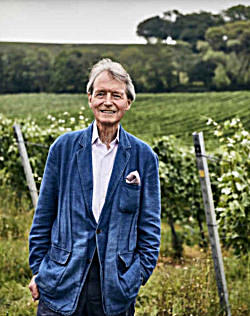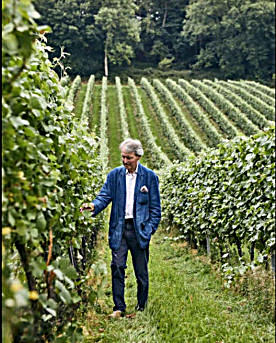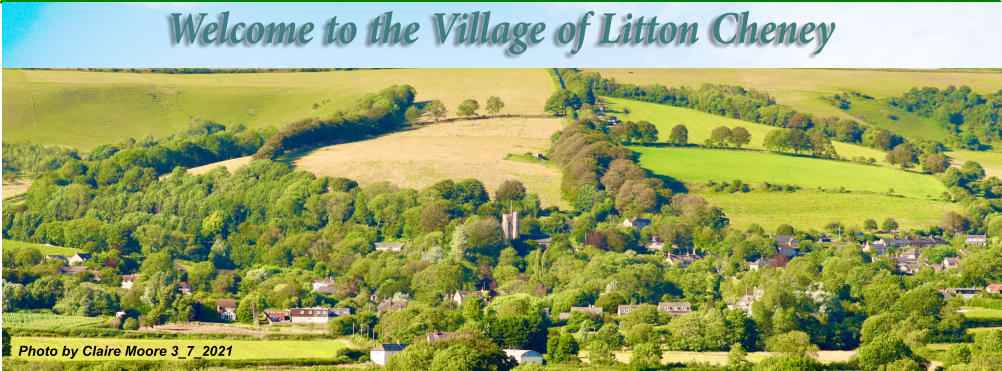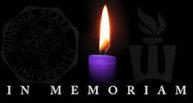
IN MEMORIAM - CONTEMPORARY
Select Name
ABOUT LITTON CHENEY



STEVEN SPURRIER 1941-2021
It is with immense sadness that we share the news of Steven’s death, on the 9th of March, at home here in Litton Cheney
surrounded by family. Steven was a pioneer in wine - a visionary who never lost his passion for new projects, new discoveries and
the world of wine.
He will always be remembered for founding the Académie du Vin, the celebrated Judgement of Paris and in recent years, the
Académie du Vin Library and, of course, together with his wife Bella, Bride Valley Vineyard – as well as much else besides. He was
also a hugely loved husband, father and grandfather.
He will be sorely missed, not just by his immediate family and friends, but by people right across the world of wine. His enthusiasm
and love of wine will live on through Bride Valley Vineyard, the Académie du Vin Library, the relaunched Académie du Vin in
Canada and through the work of the many wine makers, wine writers and wine educators he championed.Steven Spurrier was born
in Cambridge on 5 October 1941. He was educated at Rugby School, before studying at the London School of Economics. His
interest in wine was first piqued after drinking 1908 Cockburn's Port when he was 13 years old.
He entered the wine trade in 1964 as a trainee with London’s oldest wine merchant
Christopher and Co. In 1970 he moved to Paris where he persuaded an elderly lady
to sell him her small wine store located in a passageway off the rue Royale. From
1971 he ran the wine shop Les Caves de la Madeleine, where clients were
encouraged to taste wines before they bought them, which achieved recognition as
a highly regarded specialist wine shop. In 1973 he started L’Academie du Vin,
France’s first private wine school.
He sold his wine interests in France and returned to the UK in 1988, becoming a
wine consultant and journalist. He was director of The Christie’s Wine Course, which
he founded with Christie's Education in 1982. He was also a wine consultant to
Singapore Airlines, and consultant editor to Decanter. In 2019, he founded the
Academie du Vin Library with Simon McMurtrie to publish wine writing. The Library
published the latest edition of his memoir in 2020.
He received several international awards for wine writing including Le Prix de
Champagne Lanson and the Bunch Prize, both for articles published in Decanter. In
2001 he was awarded Le Grand Prix de l’Academie Internationale du Vin and The
Maestro Award in honor of Andre Tchelistcheff. In 1988 he was made Le Personalite
de l’Annee (Oenology) for his services to French wine. He has also received the Ritz
Carlton Millennia Singapore Lifetime Achievement Award and the Prix Louis
Marinier. He was a regular judge on the international wine tasting circuit and the chairman of the Japan Wine Challenge and the
Decanter World Wine Awards.
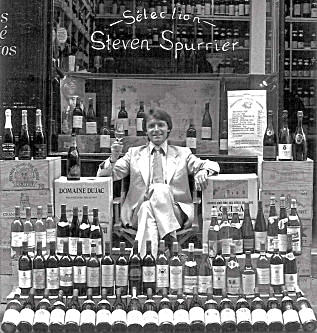
EDDY FRY 1933-2021
Obituary
Eddy Fry passed away on Saturday, March 20 at the age of 87.
Alongside his work with the Duchy of Cornwall to create Poundbury, Eddy was heavily involved in the community - becoming
president of Bridport Rotary Club in 1991.
He was best known for his work with CG Fry and Son Ltd, the building company founded by his father, Charles.
Born in Litton Cheney and schooled in Bridport, Eddie completed an apprenticeship in bricklaying with a Dorchester building
company in his youth. After completing his compulsory national service he then came back to join his father’s building and
undertaking firm.
In 1959 they built their first house together at Litton Cheney, constructed for
a chemist from Weymouth. In the same year, Eddy married his wife Sheila,
who he had been introduced to by his sister Ruth.
As the company grew, Eddy became increasingly involved in the running of
the business, overseeing refurbishment work of many large houses in West
Dorset, new buildings, and general repairs, eventually taking over the
running of the company from his father in the late 1960s.
Alongside his son, Philip, Eddy expanded the company in 1991 with award-
winning developments in Abbotsbury and Broadwindsor.
In 1992 CG Fry and Son began working with the Duchy of Cornwall,
overseen by Prince Charles, for the first phase of the Poundbury
development, designed to be an extension of Dorchester. The firm has since
been responsible for building more than 1,000 new homes, offices and shops
at Poundbury, which is currently home to approximately 3,800 people.
Eddy officially retired from the company once he reached his late 60s,
but
he never truly hung up his hard hat, always being on hand to provide
guidance and advice.
Eddy's son, Philip, said: "My father was one of West Dorset’s
characters, he had a wonderful career and achieved a huge amount
and has left a fantastic legacy. As well as being a great a family man,
was also heavily involved with the community. He had many great
friends and had a lot of fun supporting their charitable causes.
He was a true west Dorset gentleman with great character and
determination and was always willing to help and support people
throughout his life. He will be fondly remembered by family, friends
and colleagues. He touched many people's lives in a positive way.
Most of all he was family man and he will be deeply missed by us all."
Eddy leaves behind his loving wife Sheila, who has been by his side faithfully supporting him for 61
years, his two children, Janet and Philip, and his three grandchildren Francesca, Saskia and Ben.
Eddy took a great interest in the local community, particularly the Bridport Rotary Club of which he was
a longstanding member and a former president. Roger Pollock, president of the Bridport Rotary Club,
said: "Eddy Fry was a much loved and valued member of the Rotary Club of Bridport for 36 years. He
joined Rotary in 1985 and was elected president in 1991. He was awarded the Paul Harris Fellowship
award which recognises outstanding service. His enthusiasm for Rotary was evident in his fundraising
efforts over the years. Eddy will be sorely missed by all his friends in Bridport and the wider Rotary
family”
Eddy had a great love of bell ringing and was captain of the bell tower at St Mary’s Church in Litton
Cheney - as was his father before him.
He had a long-time love of all sport, especially football, following Southampton and Yeovil Town in his
later years - where he was often seen with his late friend Jack Wakely, with a scotch in hand.
Eddy's funeral will be taking place on Wednesday, March 31. He will be buried in Litton Cheney next to
his father.
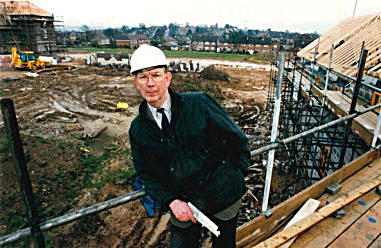
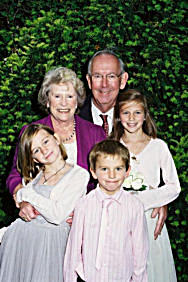
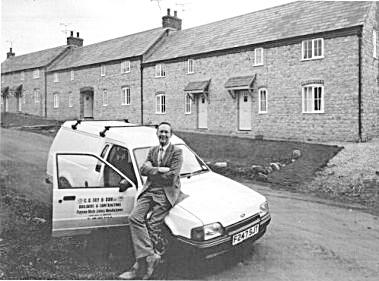
Eddy in front of affordable houses built in
Abbotsbury in 1988
Eddy on the Poundbury site in 1994
Eddy with his wife Sheila, and
their grandchildren (l to r)
Saskia, Ben and Francesca
Eulogy by Janet Fry
Devoted husband, Dad, Granpy. Successful, determined, protective, generous, supportive, kind, fun-loving. A family man who
adored his grandchildren. Obviously very proud of his son. Remained close to his cousins from Kimmeridge and West Farm. A
younger brother to Barbara, a nurse who married Wally, a Royal Marine and had Susan his niece, my cousin and friend!
A man who had little time for Health & Safety! He encouraged alcohol to be consumed in the bell chamber – he installed drinks
cabinets in the ringing chamber both at St. Mary’s Litton Cheney and at Burton Bradstock – hand made in the joinery shop. He
never considered pinning the bells when working in the belfry.
The Carol Singers used to be transported around the village on the back of a Fry’s truck. Sid and the organ were up by the cab, 2
rows of seats either side for the ladies in the choir and us girls. All was well until we had to go to The Rectory, accelerating up the
slope Sid and his organ would slide down the lorry. Dad, being tone deaf, was given the collecting tin. While we sang from the
back of the lorry, Dad went in for a whisky and a warm in most houses.
Dad managed to keep bell-ringing well into his 80’s despite being unable to lift his arms, having damaged both his shoulders after
falling off a stool trying to put up curtaining, and also falling down a manhole on site.
Whilst on holiday in Greece, Mum and I alighted from a dinghy on the harbour steps with grace and ease. Dad fell out backwards,
completely submerged – the only sign of him was his Panama hat floating by. Mum and I were creased up laughing, whilst an
onlooker eating at one of the harbour-side tavernas was very concerned. Luckily Dad retained his wallet (soggy) and glasses, but
did have to change for dinner. Swallowing harbour water had no ill effects.
Dad was a great dog lover – a walking companion and friend on site. His first dog, Bingo, used to eat pocket handkerchiefs with
great effect. Four other dogs followed. He enjoyed riding Tim the pony when he was young, from West Farm to Mosterton to
collect the bread when holidaying there. He was not a lover of cats, squirrels or badgers.
Thank you Dad:
•
For all the family holidays in Cornwall. We went foraging for cockles, mussels and winkles. Mum would boil them up and add
vinegar. Having to spend a week on the beach with wadding on your chest because you were looking at a lady in hotpants and
not at the cup of tea being delivered to you! We progressed from caravan to apartment, where we crunched around for a week
after a well-aimed bag or sugar met its target. Then to a guest house where Mrs “Excuse Me, Thank You” the host, accused
Dad of playing footsie with her. After that they went abroad where Dad liked to skinny dip, but wasn’t prepared for spectators!
•
For teaching me to drive, to speed and ignore rabbits in the road.
•
For picking me up from Discos all over West Dorset, embarrassing me by getting the DJ to announce “Janet Fry, your father is
waiting”
•
For trying to save me from Hairy Bikers with earrings and failing as you introduced me to Nick, who once was one of them.
•
For teaching me to bell-ring. I have rung wherever I have lived and also at Bath Abbey – a scary moment. Also for teaching my
husbands, thus preventing Sunday lie-ins!
You were the best Dad, we will love and remember you forever.




Article from Bridport Nub News November 2020
Many wine connoisseurs may have heard of Steven Spurrier, if you have you know how he changed the wine industry forever and
became one of the biggest names in the trade.
But you may not know he calls Litton Cheney home and makes his own wine at Bride Valley Vineyard.
Steven Spurrier was more than instrumental in changing views of the French when it came to wine and putting Californian wine on
the global wine map. And it all happened at the Judgement of Paris.
Steven had always wanted to go into the wine trade and after leaving university, worked for small wine companies and spent
months travelling around vineyards.
Steven and his wife Bella were living in Paris in the 1970s where he had a wine shop, Les Caves de la Madeleine. Someone in the
trade suggested Steven might want to check out some of the wine that was being produced in California.
In the 1970s, and prior to that as well, you didn't see many of the US wines due to laws about where wine could be sold, and at
some stages it couldn't even be sold out of state, let alone the country. So, Steven went to California, tried some of the wines and
brought them back to his wine shop in Paris.
He organised a wine tasting in 1976 which pitted the best wines be brought back from California against the best wines of the day
in France, with the tasting panel made up of the great and the good of the French wine industry.
They had a professional tasting, and had to write a note and score each wine out of 100. The two favourite wines were Californian.
Up until then, everybody thought the best wines were made in France, but that changed the whole landscape of wine globally and
a lot of French companies invested in California. This really put Steven on the map.
He was an ambassador to the wine industry, expanded into restaurants and warehouses before becoming a consultant, including
for Singapore Airlines and Decanter. There is a Judgement of Paris day in California and even a road named after him.
On the 40th anniversary of the Judgement of Paris in 2016, Steven was invited to Washington to a state banquet in his honour
where he was presented with an American flag.
He has written books, is honorary chairman of the International Wine and Spirits Competition and won a whole host of awards,
including lifetime achievement awards and being named Decanter Man of the Year in 2017, but too many to list.
So, how did a man so renowned in the wine industry, and across the world, end up in a small Dorset village near Bridport
with his own vineyard?
They had a big house in London, but Bella wanted a house in the country. They had their eye on their home in Litton Cheney
before it was even on the market and after a few years, they eventually brought it in 1987.
However, they needed more space for their horses and ended up buying a 200-acre farm on the edge of the village. Steven
noticed that the land was riddled with chalk.
He put a couple of small blocks in his pocket to show to Michael Bettane, the top lecturer at
his wine school, L'Academie du Vin, and asked him where they came from. 'Champagne, of
course', was his reply but Steven explained it was actually from Dorset, to which he said: "In
that case you should plant a vineyard."
Inspired by this, Steven invited his friend Michael Laroche for a weekend and asked him to
take some soil samples back to Chablis for analysis.
Steven said: "The results were positive for Chardonnay and cool climate varietals like Pinot
Blanc and Pinot Noir. Nice to know, but we did nothing about it.
"Time passed and in the mid 1990s, attending the awards ceremony of the International wine
and spirit competition, I was offered a glass of fizz and asked what I thought it was.
'Champagne of course, certainly a Blanc de Blancs, probably from Grand Cru', was my reply.
Quite wrong, for it was Nyetimber Blanc de Blancs 1989 from Kent. Substantially expanded
since then, Nyetimber is still the leading brand of English sparkling wine and 25 years ago it
had beaten the Champagnes and top sparklers from all over the world. Fifteen years later,
Ridgeview from Sussex repeated this at the 2010 Decanter World Wine Awards, but by that
time, the first two hectares of Bride Valley Vineyard had already been planted."
The farm, apart from having one of the most chalk-based soils in the country – it is only 24
miles from Kimmeridge which gave its name to the similar soils in Champagne – is a steeply
sloping half circle of land, where the south, south east and south west facing slopes seemed
perfect for vines.
Steven added: "Seeing the increasing success of English sparkling wines, I compiled a dossier to present to the Boisset family
from Burgundy, one of the great specialists in this category, in 2007 with the possibility of a joint venture.
"They were on board immediately and George Legrand and his team came out with the aim of finding around 30 hectares to plant
for a potential production of 150-200,000 bottles which could be produced in a purpose-built winery."
However, there were only 10-12 hectares of really prime potential vineyard, but Steven and Bella were advised to prepare the
plots for planting, buy vines from Pepinieres Guillaume – the world's best vine nursery in northern Burgundy – take the grapes to
Ian Edwards, 2012 English Winemaker of the Year at nearby Furleigh Estate, to get them
checked out and if all goes well, the Bossiet family would buy the wine.
With this encouragement, the first vines were planted in 2009 and the final one in 2013.
There are now more than 40,000 vines on just over 10 hectares – 55 per cent Chardonnay,
25 per cent Pinot Noir and 20 per cent Pinot Meunier.
"My back of an envelope prediction," said Steven, "was that we would produce a bottle a
vine, less than the litre a vine that top English vineyard consultant Stephen Skelton MW
advises his clients and considerably less than in Champagne.
"Only the 2014 vintage gave quantity and by the time the grapes were pressed after the
2017 vintage, we were looking at an average of just one third of a bottle a vine.
"Then 2018 turned out to be a Mediterranean summer, giving us 60,000 bottles and we even
made some very well received still Chardonnay and Pinot Noir, and the less ripe 2019
brought in 52,000 bottles, so we were back on track."
From 2019 they made another Chardonnay and from the second pressing, produced some
deliciously fruity still Dorset Pinot Noir Rose. Bride Valley's sparkling wines, which make up
85 to 90 per cent of the production, come under four labels: Dorset Cremant, the first and
still the only English Cremant; Brut Reserve, a dominant blend of Pinot Noir with
Chardonnay; Blanc de Blancs, always 100 per cent Chardonnay; and Rose Bella, a blend of
Pinot Noir for colour and fruit and Chardonnay for vivacity.
Steven added: "As founder of the Decanter World Wine Awards and last year a panel judge
alongside Anthony Dias-Blue at the San Francisco Wine Competition, I know that wine competitions are only as good as the
judges, and respecting Susie Barrie MW, Rebecca Palmer and Oz Clarke, sole judges for the 2020 Wine GB Awards, I put in our
full range. Every wine got a medal."
Bronze was awarded to Pinot Noir Rose 2019 and Brut Reserve 2017, with silver going to Chardonnay 2018, Pinot Noir 2018,
Dorset Cremant 2015/17, Blanc de Blancs 2017 and Rose Bella 2016.
"The Bride Valley team thought we should have got a gold, but we are not there yet," added Steven. "When the 2018s will be
entered in early 2022 I think we will be.
"The flagship wine is the Blanc de Blancs, as it really represents the soil and the Chardonnay is our best producing grape.
"I always say, if I am going to a professional tasting, I will bring our Blanc de Blancs, if I'm going to see friends, I'll bring the rose."
Why the name Bride Valley?
Steven said: "We are fortunate to be in an area deemed 'of natural beauty', consisting of seven historic villages along the River
Bride, the shortest river in England, which rises at Bridehead House and meanders for eight miles before joining the English
Channel at Bridport.
"In my view, wines should have a 'sense of place' and this they definitely possess."
As Bride Valley harvests its 10th vintage, where are they now?
Wine and art are linked at Bride Valley, Steven says it 'adds an element – a personal element – because it is all about
connections'. He feels very much that wine is a cultural object.
"At first there was little to connect Bride Valley and Art," said Steven, "but over the past two years in the stable block behind our
house, I have created a wine and art room next to our tasting room. This houses much of my collection of wine related pictures,
objects and artefacts.
"Light and airy, it is a sort of kaleidoscope of visual images, where we can seat up to 24 for a tasting.
"Along the wall outside there is a disused stone lean-to building which will soon be converted to an art studio for Bella, while in the
gardens at the back I have six free-standing sculptures by only women artists, which adds another dimension for visitors who
come to taste.
"Philippine de Rothschild once said that, 'producing wine is easy, it's the first 100 years that are difficult'. Bride Valley is for the next
and succeeding generations and Bella and I are proud to continue to develop what we can pass on to them."
